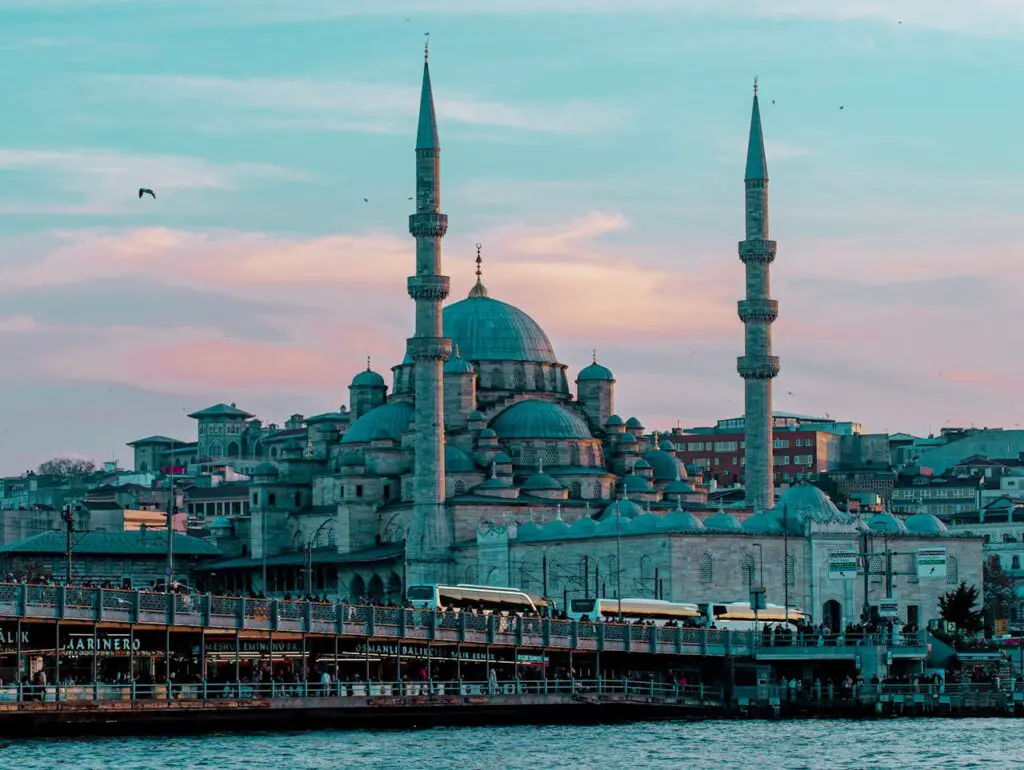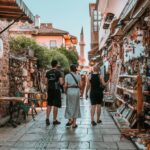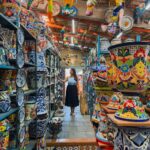Introduction: The Joy of Shopping in Turkey
Turkey’s bazaars have enticed travelers for centuries with their kaleidoscope of colors, symphony of sounds, and treasury of unique handicrafts. Shopping here transcends mere transaction—it’s a cultural immersion, a chance to connect with artisans whose families have practiced traditional crafts for generations. From the labyrinthine Grand Bazaar in Istanbul to the cave shops of Cappadocia, Turkey offers shopping experiences as diverse and captivating as its landscape.
As you wander through centuries-old market halls or modern boutiques, you’ll discover a wealth of authentic treasures that tell the story of Turkey’s rich cultural heritage. In our Turkey Shopping Guide I will help you navigate Turkey’s shopping scene, highlighting what to buy, where to find the best deals, and how to ensure you’re purchasing authentic items that will become cherished mementos of your journey.
Must-Buy Turkish Souvenirs and Products
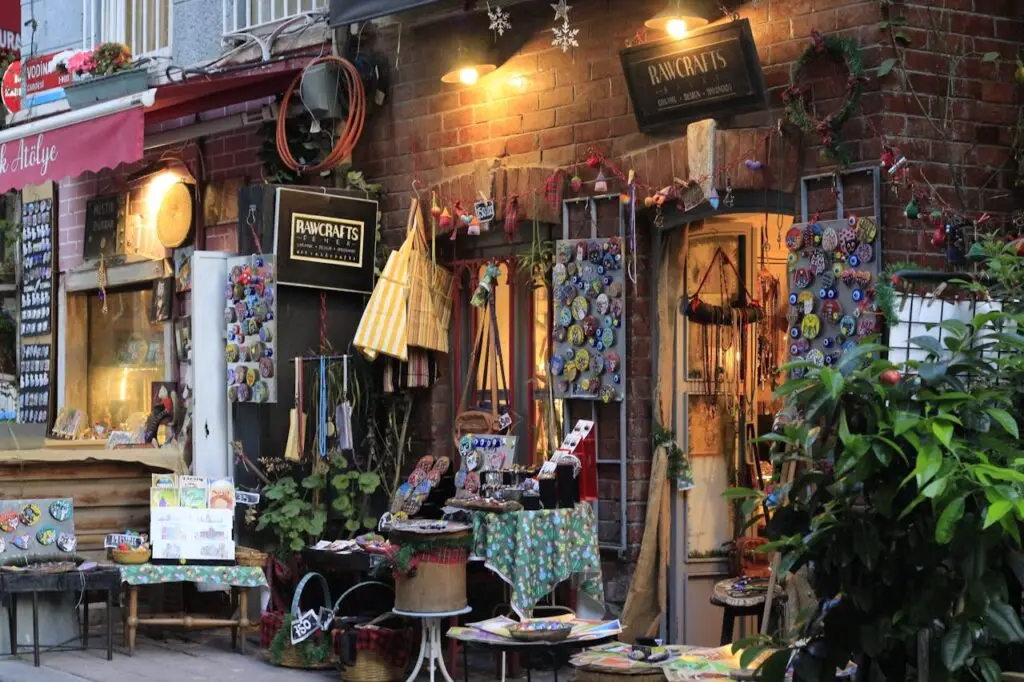
Turkish Carpets and Kilims
Turkish carpets represent one of the world’s oldest textile traditions, with designs and techniques passed down through generations. Each region produces distinctive styles, from the double-knotted Hereke silk carpets to the vibrant kilims of Central Anatolia.
Where to buy: While you’ll find carpet shops throughout tourist areas, consider these reputable options:
- Istanbul: Ethnicon and Mevlana Carpet Gallery in Sultanahmet; Dhoku in Karaköy for contemporary designs
- Cappadocia: Galeri Ikman in Göreme; Sultan Carpets in Uçhisar
- Konya: Mevlana Carpet Cooperative
What to expect to pay: Hand-knotted wool carpets start around $300-500 for a small piece (3×5 feet), while silk carpets can cost several thousand dollars. Kilims are generally more affordable, starting around $150-200.
Pro tip: Reputable shops will offer shipping services and provide certificates of authenticity. Take time to learn about different styles and qualities before purchasing—the best shops will educate rather than pressure you.
Turkish Ceramics and Tiles
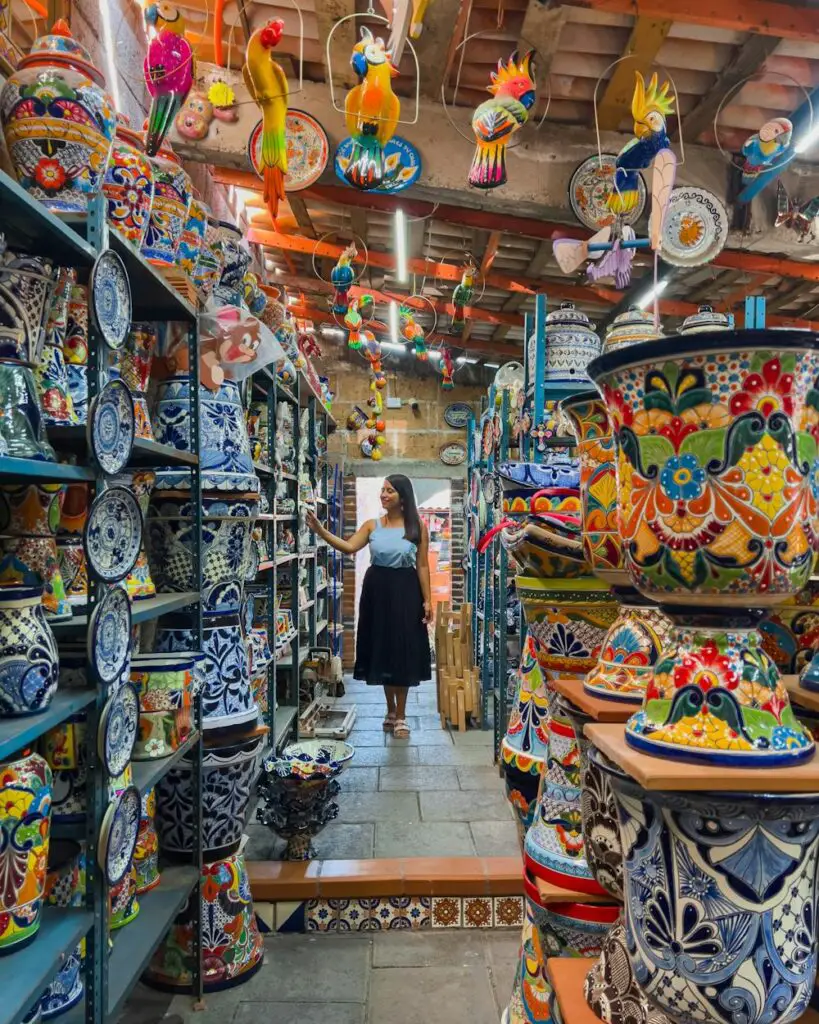
Turkey’s ceramic tradition dates back to the Iznik pottery of the Ottoman era, known for its distinctive blue and white designs. Today, you’ll find everything from traditional plates and bowls to contemporary interpretations.
Where to buy:
- Istanbul: Iznik Classics in Arasta Bazaar; Ceramics Workshop in Grand Bazaar
- Cappadocia: Chez Galip in Avanos (where you can even try pottery-making)
- Kütahya: The city is famous for ceramics production; visit small workshops for direct purchases
What to expect to pay: Small decorative pieces start around $15-30, while larger hand-painted plates or tiles range from $50-200 depending on quality and complexity.
Pro tip: Look for the artist’s signature on the bottom of quality pieces. Machine-made items are significantly cheaper but lack the character and value of handmade ceramics.
Turkish Textiles and Linens
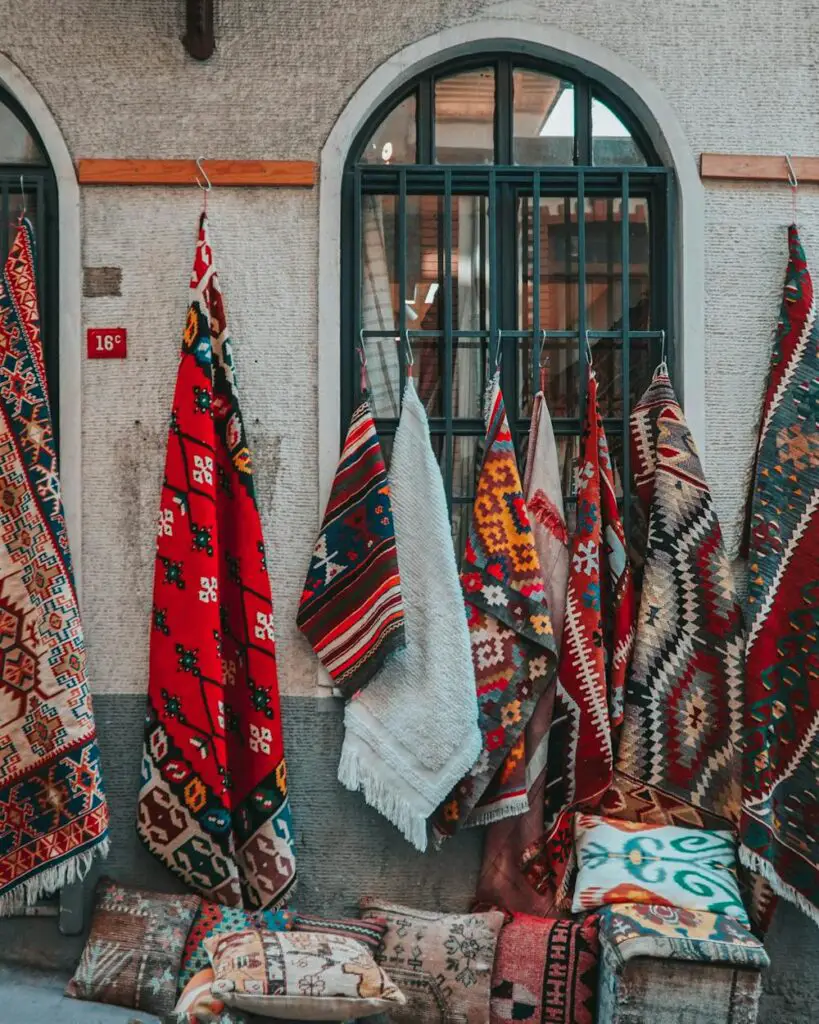
Turkish cotton is renowned worldwide for its quality, particularly the peştemal (traditional thin towels) and luxurious bath towels.
Where to buy:
- Istanbul: Jennifer’s Hamam in Arasta Bazaar for organic cotton products; Abdulla Natural Products in the Grand Bazaar
- Bursa: The historic silk market (Koza Han)
- Denizli: Known for textile production; factory outlets offer good deals
What to expect to pay: Quality peştemals range from $15-30, while premium Turkish cotton bath towel sets can cost $50-100.
Turkish Spices and Delicacies
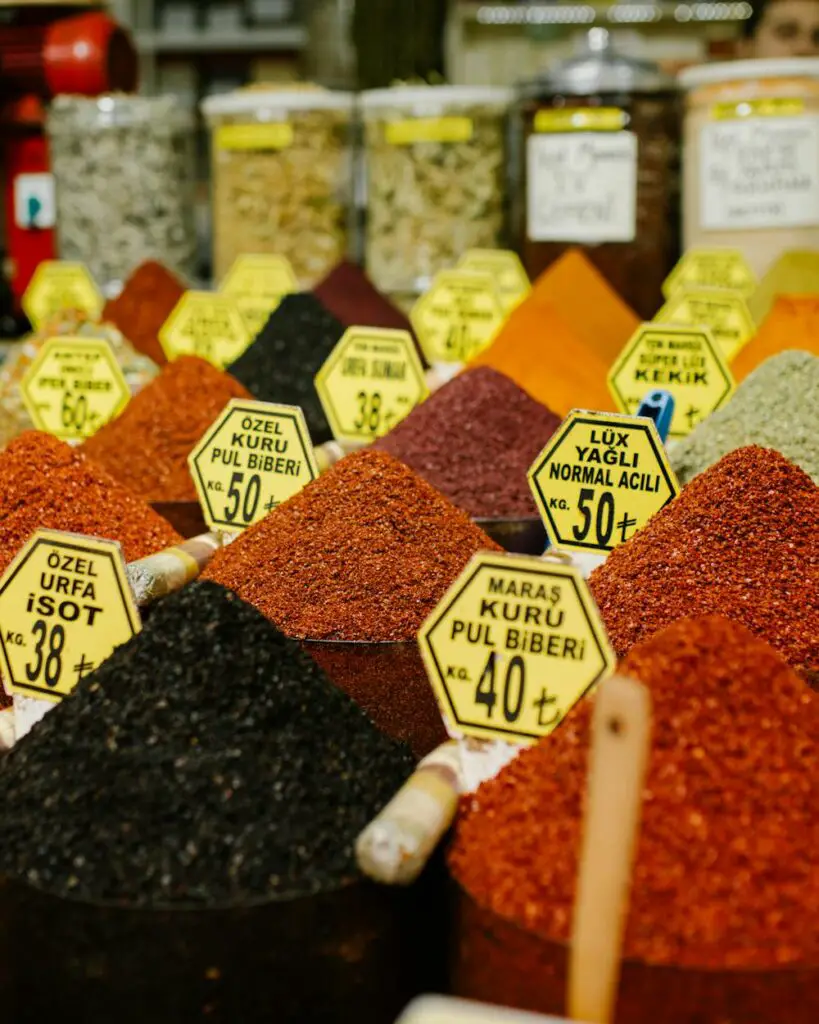
Turkey’s culinary heritage is rich and diverse, offering many portable delicacies to bring home.
What to buy:
- Spices: Sumac, Aleppo pepper, pul biber (red pepper flakes), and authentic Turkish saffron
- Turkish delight (lokum): Available in countless flavors beyond the typical rose and pistachio
- Turkish coffee and accessories: Copper cezves (coffee pots) and freshly ground Turkish coffee
- Olive oil and olives: Particularly from the Aegean region
- Nuts and dried fruits: Turkish pistachios, dried apricots, and figs
Where to buy:
- Istanbul: Spice Bazaar (Mısır Çarşısı); Kurukahveci Mehmet Efendi for coffee
- Gaziantep: Famous for pistachios and baklava
- Aegean Region: Local markets in Izmir or Bodrum for olive products
What to expect to pay: Spices range from $3-10 per 100g depending on rarity; quality Turkish delight costs $5-15 per box; a handmade copper cezve ranges from $20-50.
Turkish Leather Goods
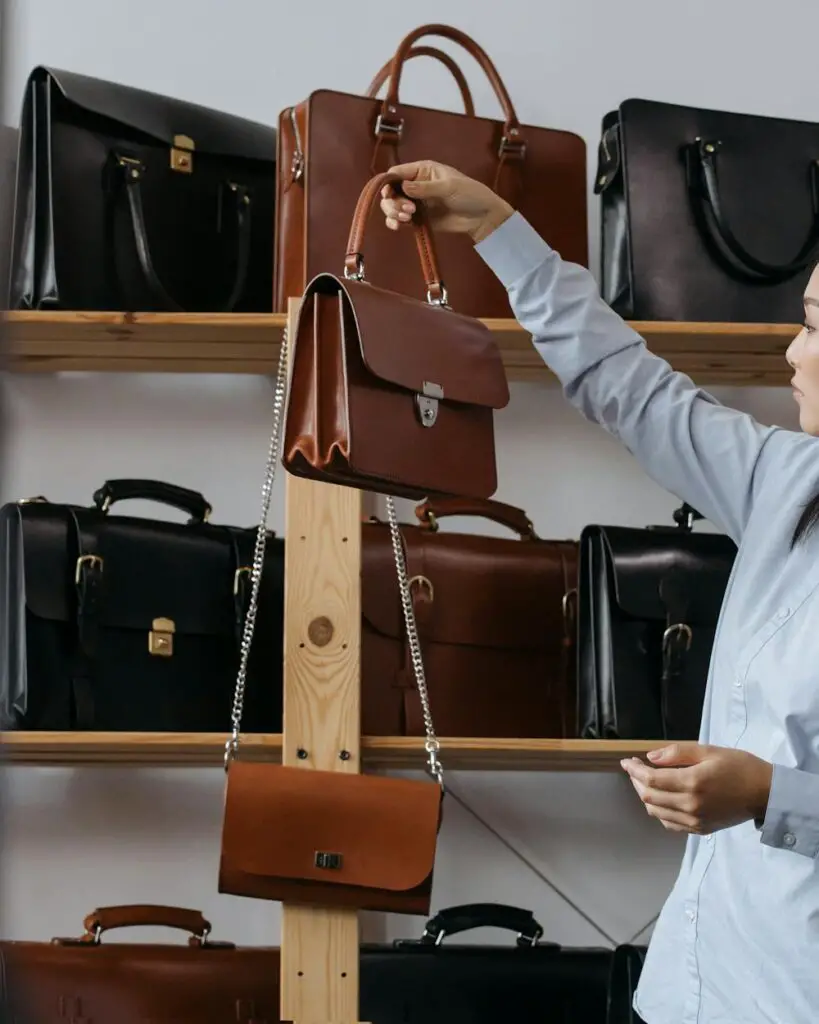
Turkey produces high-quality leather products, from jackets and bags to wallets and shoes.
Where to buy:
- Istanbul: Grand Bazaar leather shops; Serdar Leather in Sultanahmet
- Ankara: Kızılarık Leather in Çıkrıkçılar Yokuşu
- Selçuk/Ephesus area: Leather production centers with factory outlets
What to expect to pay: Leather jackets range from $150-500 depending on quality; smaller items like wallets start around $20-30.
Pro tip: Be particularly cautious with leather purchases, as quality varies dramatically. Check stitching, lining, and smell the leather—genuine leather has a distinctive, pleasant aroma.
Turkish Lamps and Lanterns
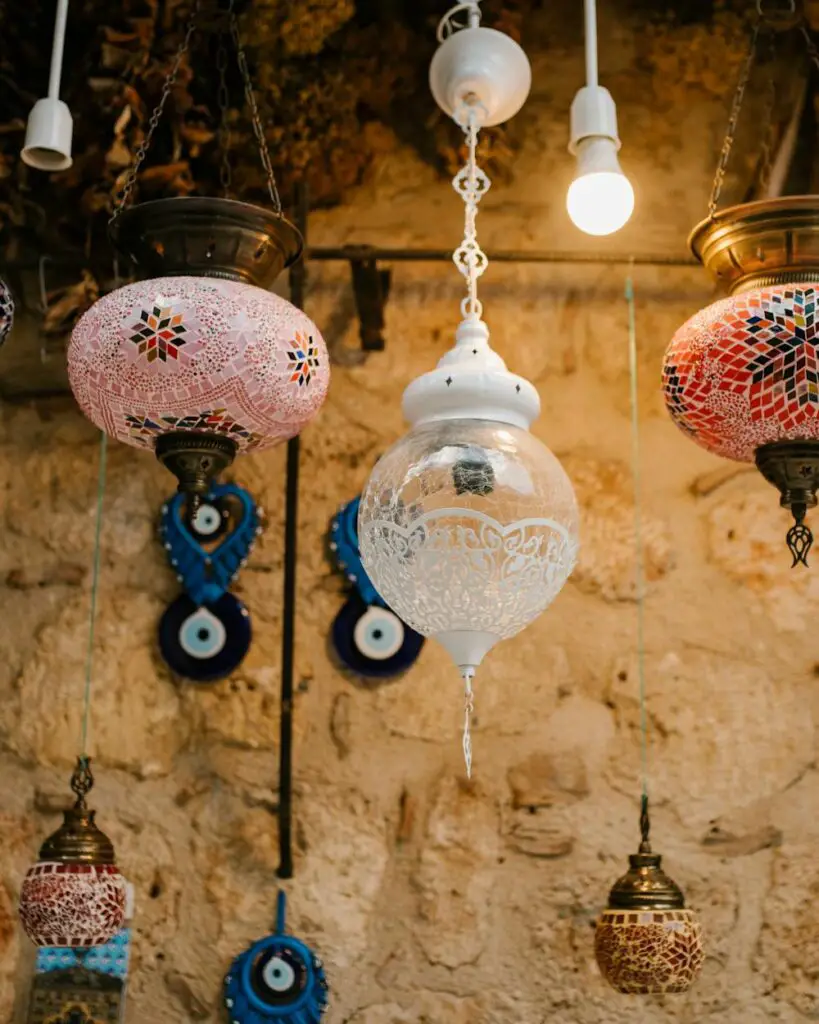
The iconic mosaic glass lamps create a magical atmosphere with their colorful patterns and intricate designs.
Where to buy:
- Istanbul: Grand Bazaar lamp shops; Osmanli Lighting in Sultanahmet
- Cappadocia: Numerous shops in Göreme and Ürgüp
What to expect to pay: Small table lamps start around $30-50, while larger, more intricate chandeliers can cost $200-500+.
Pro tip: Most shops can convert lamps to work with your home country’s electrical system. Confirm this before purchasing and ask about shipping options for larger pieces.
Best Shopping Destinations in Turkey
Istanbul: The Shopping Capital
As Turkey’s largest city and cultural crossroads, Istanbul offers the most diverse shopping experiences:
Grand Bazaar (Kapalı Çarşı)
Grand Bazaar is one of the world’s oldest and largest covered markets, with over 4,000 shops spread across 61 streets. You’ll find everything from carpets and jewelry to ceramics and textiles.
Pro tips:
- Visit on a weekday morning to avoid crowds
- Venture beyond the main thoroughfares to find better prices
- Shops in the center typically charge more than those on the periphery
- Closed on Sundays
Spice Bazaar (Mısır Çarşısı)
Smaller than the Grand Bazaar but equally atmospheric, specializing in spices, Turkish delight, teas, and other culinary treasures.
Pro tips:
- Compare prices before buying, as they vary significantly
- Shops outside the bazaar often offer the same products at lower prices
- Try samples before purchasing, especially for Turkish delight
Arasta Bazaar
A smaller, more manageable market behind the Blue Mosque, with higher-quality shops and less aggressive selling tactics.
İstiklal Avenue and Beyoğlu
Modern shopping street with international brands, Turkish designers, and concept stores. Check out the historic passages (arcades) branching off the main street.
Nişantaşı
Upscale shopping district with luxury brands and high-end Turkish designers like Vakko and Beymen.
For a more detailed exploration of Istanbul’s shopping scene, see our article on “Best Shopping Experiences in Turkey by City: Istanbul, Antalya, Cappadocia, and More“.
If you’re a fan of shopping malls, check out these two articles: Best Shopping Malls in Istanbul and Best Outlet Malls in Istanbul your ultimate guides to retail therapy in the city.
Cappadocia: Artisanal Treasures
The fairy-chimney landscape of Cappadocia houses unique shopping opportunities:
Göreme and Ürgüp
The main towns feature numerous shops selling local onyx stone products, ceramics, and textiles. Göreme’s main street is lined with souvenir shops, while Ürgüp offers a more local experience.
Avanos
Famous for its pottery tradition dating back to the Hittites. Visit workshops where you can watch artisans at work and even try your hand at the potter’s wheel.
Cave Shops
Unique to Cappadocia, these shops are carved into the soft tufa rock, creating atmospheric shopping environments, particularly for carpets and ceramics.
Antalya: Mediterranean Flair
Turkey’s Mediterranean hub offers a mix of traditional and contemporary shopping:
Kaleiçi (Old Town)
Winding streets filled with shops selling leather goods, jewelry, and souvenirs. More atmospheric than the modern shopping centers.
Antalya Bazaar
Located near the clock tower, this covered market offers spices, textiles, and local products.
Mark Antalya and TerraCity
Modern shopping malls with international and Turkish brands, ideal for clothing and electronics.
Bodrum: Coastal Chic
This Aegean resort town offers upscale shopping with a coastal vibe:
Bodrum Marina
Upscale boutiques and designer stores line the marina, selling resort wear and luxury items.
Bodrum Market
Held on Tuesdays and Fridays, offering fresh produce, spices, and textiles. The Tuesday market is larger and more tourist-oriented.
Türkbükü
The “St. Tropez of Turkey” features exclusive boutiques and designer shops.
How to Ensure Authenticity
Carpets and Textiles
- Hand-knotted carpets have distinct patterns on both sides (though not identical)
- Turn the carpet over—machine-made carpets have a backing or uniform appearance on the reverse
- Natural dyes have subtle variations in color; chemical dyes appear more uniform
- Ask about materials and knot density—higher density indicates better quality
Ceramics
- Hand-painted ceramics show slight imperfections and variations
- Look for the artist’s signature on quality pieces
- Traditional Iznik designs feature deep blues, turquoise, red, and black
Leather
- Real leather has a distinctive smell and texture
- Check the stitching for evenness and quality
- The leather should feel supple, not stiff or plastic-like
Turkish Delight and Spices
- Quality Turkish delight uses real sugar (not glucose syrup) and natural flavorings
- Authentic shops let you sample before buying
- Spices should have vibrant colors and strong aromas
Navigating Prices and Bargaining
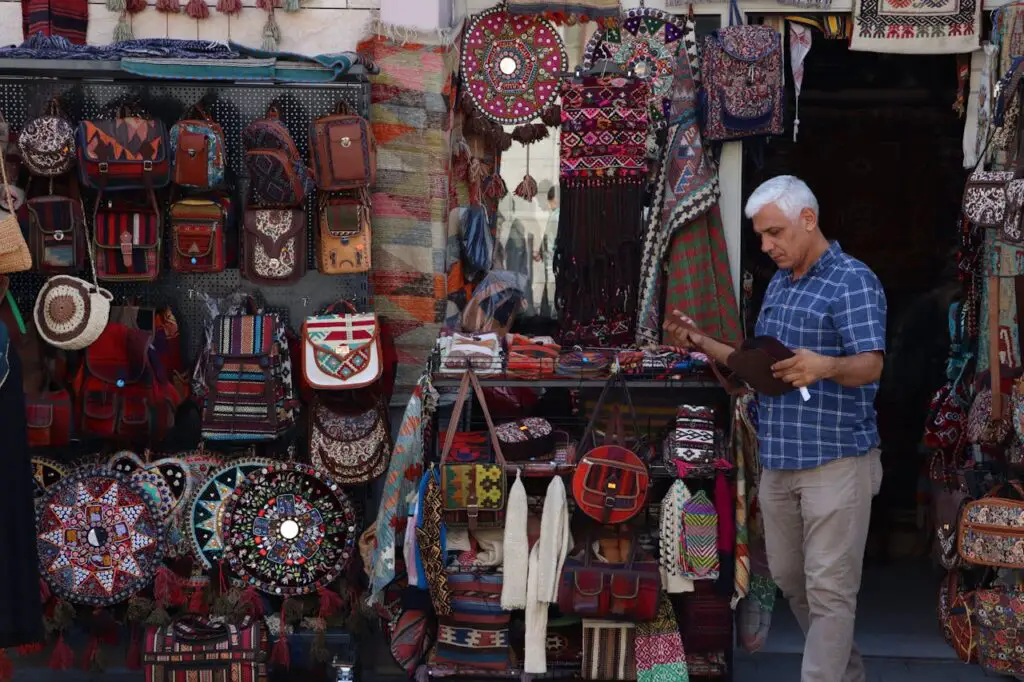
Bargaining is an expected part of the shopping experience in bazaars and small shops (though not in department stores or fixed-price boutiques). For detailed guidance on bargaining etiquette and strategies, see our article on “Shopping in Turkey: Prices, Bargaining Tips, and What to Expect”.
General Price Guidelines
While prices vary widely based on quality, location, and your bargaining skills, here are some general ranges to help you gauge fair prices:
| Items / Products | Average price |
| Small souvenirs | $5-15 |
| Quality Turkish delight box | $10-20 |
| Hand-painted ceramic plate | $30-100 |
| Small kilim (flat-weave rug) | $100-300 |
| Medium wool carpet | $500-1,500 |
| Silk carpet | $1,000-5,000+ |
Tax Refund Opportunities
As a tourist, you can receive a VAT refund on purchases over a certain amount from shops participating in the “Global Blue” tax-free shopping program. For a detailed explanation of the process, see our article on “Turkey Shopping Tax Refund Guide: How to Get Your VAT Back”.
Shopping Etiquette and Cultural Tips
Accepting Hospitality
Turkish merchants often offer tea as a gesture of hospitality, not necessarily as a sales tactic. It’s perfectly acceptable to accept tea, chat, and leave without purchasing if you don’t find what you’re looking for.
Building Relationships
Taking time to establish rapport with shopkeepers can lead to better prices and a more authentic experience. Show genuine interest in their craft and family business.
Photography Etiquette
Always ask permission before photographing merchandise or people in shops and markets.
Dress Appropriately
While Turkey is generally progressive, dressing modestly (especially in more traditional areas) shows respect and may help you receive better treatment from merchants.
Shipping and Customs Considerations
Shipping Options
Most established shops offer international shipping services. While this adds cost, it’s often worth it for larger items like carpets or ceramics. Get a written agreement detailing shipping costs, insurance, and delivery timeframe.
Customs Regulations
Be aware of your home country’s customs regulations before purchasing. Items like food products, antiques, and certain animal products may be restricted.
Packing Tips
If carrying purchases home yourself:
- Ask shops for secure packaging
- Keep fragile items in carry-on luggage when possible
- Save space by wearing new clothing items or shoes
- Consider vacuum-compression bags for textiles
Seasonal Shopping Opportunities
Summer Bazaars
Coastal towns come alive with night markets during summer months, offering unique local products and a festive atmosphere.
Winter Sales
January and February bring significant discounts at department stores and boutiques, particularly in Istanbul.
Festival Markets
Special markets appear during religious holidays like Ramadan and secular celebrations like Republic Day, offering unique seasonal items and foods.
FAQs About Shopping in Turkey
Is it safe to use credit cards in Turkey?
Yes, credit cards are widely accepted in established shops, malls, and restaurants. However, carry some cash for small purchases and markets. Use credit cards with chips for added security, and always check your statements afterward.
How can I tell if a Turkish carpet is authentic?
Authentic Turkish carpets have distinct patterns visible on both sides, though not identical. The fringe should be part of the carpet’s structure, not sewn on. Natural dyes show subtle variations in color, while synthetic dyes appear more uniform. Reputable dealers will provide certificates of authenticity.
Can I ship my purchases home?
Yes, most established shops offer international shipping services. Get a written agreement detailing shipping costs, insurance, and delivery timeframe. For valuable items like carpets, consider using a shipping service with tracking.
What are the best souvenirs to buy in Turkey on a budget?
Affordable yet authentic souvenirs include Turkish delight, spices, evil eye amulets, peştemal towels, small ceramics, and lokum (Turkish delight). These typically range from $5-30 and are easily packable.
Are antiques legal to export from Turkey?
Turkey strictly regulates the export of antiquities and items over 100 years old. Items deemed cultural heritage cannot leave the country. If purchasing something that appears antique, ensure the shop provides proper export documentation.
Conclusion: Treasures Beyond the Material
Shopping in Turkey offers more than just the acquisition of goods—it provides a window into the country’s rich cultural heritage, artistic traditions, and the warmth of its people. The carpet you bring home isn’t just a decorative piece; it’s a tapestry of stories woven by hands that have preserved ancient techniques. The ceramic plate isn’t merely a dish; it’s a canvas painted with designs that have adorned Turkish art for centuries.
As you explore Turkey’s markets and shops, embrace the experience beyond the transaction. Accept the offered tea, listen to the stories behind the crafts, and appreciate the cultural exchange that has been happening in these marketplaces for centuries. The most valuable souvenirs you’ll bring home may well be the memories of these authentic encounters.
For more specific information about shopping in different Turkish cities, check out our article on “Best Shopping Experiences in Turkey by City: Istanbul, Antalya, Cappadocia, and More”. If you’re interested in focusing specifically on authentic souvenirs with cultural significance, our “Authentic Turkish Souvenirs: The Complete Shopping Guide” provides in-depth information.
